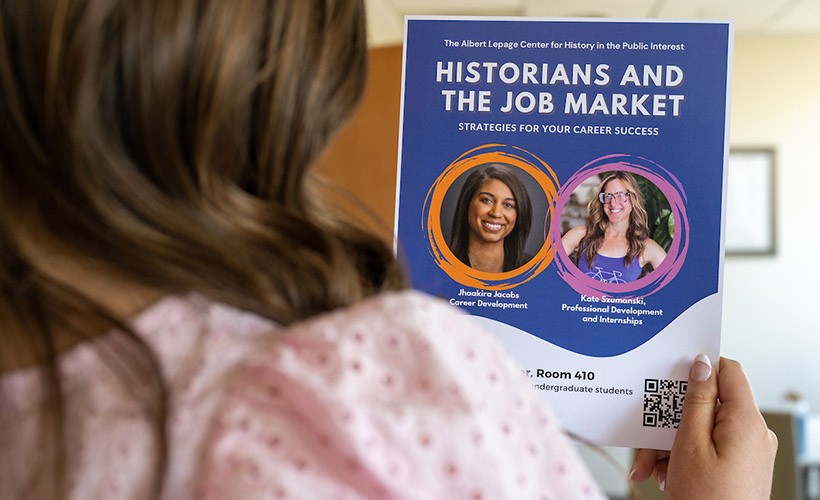STUDENT RESOURCES AND OPPORTUNITIES

The Lepage Center offers Villanova students a range of opportunities to develop transferable skills and professional experience in history, communications and research.
Fellowships
The Center annually selects two to three graduate and undergraduate History students to serve as Lepage fellows. This year-long opportunity provides students with hands-on experience in event planning, programming and communications.
Students interested in learning more about the fellowship should email lepage@villanova.edu.
Summer Internship Program
The Lepage Center offers funding for Villanova undergraduate and graduate students to develop their professional skills with paid summer internships. We partner with historical organizations across the country, providing Lepage interns with first-rate experiences working on projects that serve the public interest.
Internships are open to current and graduating students. Interns work full-time (35 hours per week) for at least eight weeks. The stipend for undergraduate internships is $5,000 while graduate interns receive $6,000. Stipends are intended to cover housing, travel and daily living expenses.
Summer 2026 Internship Application
We are currently accepting applications for our 2026 internship cycle. After students are matched with programs, internships will commence between late May and early June and continue for two months during the summer.
If you are interested in becoming a Lepage Center intern, please submit the following to Lepage Center Assistant Director Kevin Fox at lepage@villanova.edu:
- Cover Sheet: Applicants should include contact info, major/minor, anticipated date of graduation, name of a Villanova professor to serve as reference, and names of up to three preferred internships ranked 1-3. Please specify if you will need support for travel to your internship location.
- Application letter: Applicants should explain their interest in their preferred internships, relevant experience or coursework and what they hope to gain from a summer internship.
- Resumé
- Transcript (unofficial)
The application deadline is 11:59 p.m. on February 9, 2026.
American Historical Association (Washington, D.C.)
The Dialogue Institute at Temple University (Philadelphia, PA)
Fabric Workshop Museum (Philadelphia, PA)
Hagley Museum (Wilmington, DE)
Hershey History Center (Hershey, PA)
Maryland State Archives (Annapolis, MD)
Mutter Museum (Philadelphia, PA)
Science History Institute (Philadelphia, PA)
Prallsville Mills (Stockton, NJ)
"History Matters" Workshops
Created in collaboration with the Office for Undergraduate Studies and the Career Center, History Matters workshops offer guidance and skill-building advice for students at all stages of their Villanova education.
Workshops feature experts from the Villanova community and beyond working in academia, history, law, education and more.
Whether you're an undecided undergraduate student, a History major, minor or a graduate scholar, we tailor opportunities for all History department members to identify and develop their career paths.
Lunch with Lepage
Over an informal meal, Villanova students, staff and faculty explore current events and issues through a historical lens, using the past to illuminate the present.
Past topics include US elections, culture wars in public schools, archaeological digs in Egypt, suffragist hunger strikes, Black antifascism, propaganda and race riots, the Russian Revolution and more.
